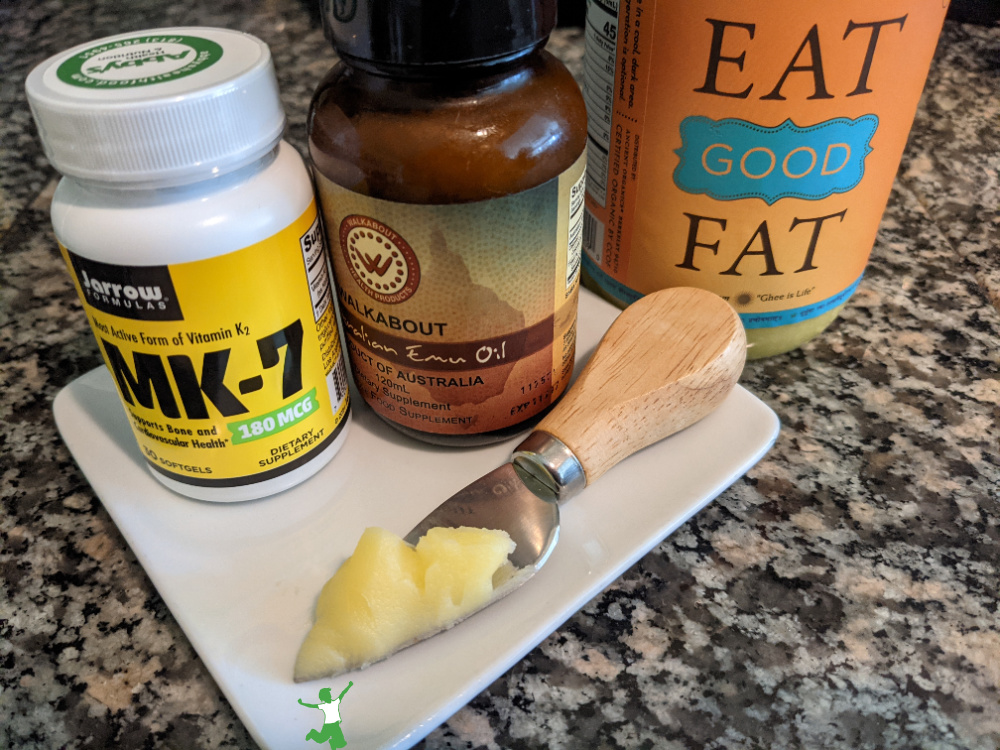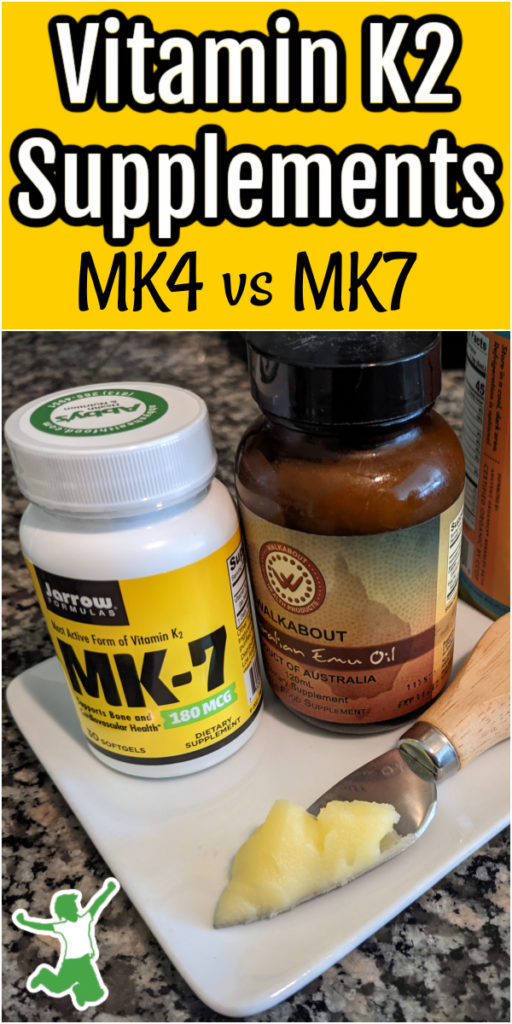Discussion of the various vitamin K2 supplements on the market with a comparison of MK-4 from animal sources or MK-7 from bacterial fermentation to ensure the diet contains sufficient amounts of this elusive yet critical nutrient.

Getting enough Vitamin K2 is absolutely essential to vibrant health. Surprisingly, the vast majority of people are seriously deficient.
Even those eating a completely whole food, organic diet, usually fall short when it comes to getting enough of either of the two major forms: MK-7 and MK-4.
Traditional Societies instinctively put great importance on foods high in Vitamin K2.
These sacred foods were consumed in larger quantities by young couples preparing to conceive.
In addition, pregnant and breastfeeding women, growing children, and the elderly received more to preserve health during these critical times of life.
Sufficient Vitamin K2 along with the other critical fat-soluble activators A and D are especially important for pregnant women to consume to ensure healthy babies.
It is important to note that Vitamin K1 from leafy greens is a different nutrient! It is not the same as Vitamin K2 found in the sacred foods of traditional cultures.
The best food sources of Vitamin K2 are grass-fed dairy products, emu oil, gouda, brie cheese, and natto, a very strong-tasting fermented soy product with roots in Japan.
Vitamin K2 from animal sources is MK-4, while K2 produced by bacterial fermentation as found in natto or cheese is MK-7.
Getting Enough Vitamin K2 in the Diet
Unfortunately, even if one consumes plenty of grass-fed dairy, getting enough K2 in the diet is still a challenge. This is due to the worrisome depletion of our soils which will take generations to repair.
Consider that the spring butter of the traditional Alpine living Swiss was an orange color. Grass-fed spring butter today is at best deep yellow.
No doubt, the soil that produced the rapidly growing spring grass that the Alpine cows grazed upon was much higher in nutrients to produce orange butter which the Swiss reverently placed in bowls with wicks to burn in their Churches.
K2 Is Not Recycled by the Body like K1
One factor contributing to widespread Vitamin K2 deficiency is the apparent lack of recycling of this nutrient by the body.
This is in contrast to Vitamin K1 from leafy green vegetables, which can be reused metabolically.
This means that Vitamin K2 stores can be quickly depleted with invisible deficiency occurring in as little as 7 days.
This is concerning especially if you are taking Vitamin D or calcium supplements. Sufficient K2 is necessary to prevent arterial calcification when the intake of these synergistic nutrients is high.
K2 Supplements Bridge the Dietary Gap
While it is always best to strive to get your nutrients from food, the critical nature of Vitamin K2 and the depletion of our soils indicates to me that supplementation is a good idea.
I did not feel certain that we could get enough K2 by eating reasonable amounts of whole and even sacred foods from grass-fed sources like Traditional Societies would have obtained by eating a similar diet.
Based on population studies and data obtained from Vitamin K2 doses given in clinical trials, it seems that 45 mcg/day would be the minimal dose needed for any sort of therapeutic effect.
Several hundred mcg/day is a better target as this is what frequent natto eaters in Japan consume.
The good news is that Vitamin K2 has no known toxicity. Thus, adding a daily supplement taken with food to improve absorption has no downside.
MK-7 vs MK-4
If you decide that taking a Vitamin K2 supplement makes sense to you, which should you choose?
If given the choice, I prefer MK-4, the animal form of Vitamin K2 over MK-7, the form of K2 from bacterial fermentation.
I get MK-4 in my diet by cooking frequently with pastured ghee, the clarified form of butter. I also eat plenty and a wide variety of cheeses along with pastured butter and eggs.
MK-4 from Food
When it comes to the animal form of Vitamin K2…MK-4…you really must get it from Real Food. The best sources are grass-fed butter, emu oil, ghee, goose liver, cheese, and pastured egg yolks.
I cannot stress enough that these are critical whole foods in your diet.
You cannot rely on a supplement form of MK-4, known as menatetrenone, because it is synthetic.
This is similar to the widespread issue of synthetic vitamin C supplements. Incidentally, folic acid is synthetic too (you want folate).
Synthetic MK-4
The supplement form of MK-4 is commonly extracted from tobacco, most likely of GMO origin (90% of tobacco crops are genetically modified).
It is not the same MK-4 as found in grass-fed butter oil, eggs, goose liver, gouda cheese, or pastured emu oil.
Supplement manufacturers rely on synthetic MK-4 because it would be prohibitively expensive to obtain this nutrient from whole food sources.
MK-4 in the Blood
Another big downside of synthetic MK-4 is the very short time it remains in the body.
For this reason, dosing every few hours is necessary to maintain therapeutic levels in the blood.
This is a very inconvenient aspect of these supplements that is rarely understood by consumers looking for therapeutic benefits.
Natural MK-7 Supplements
While MK-4 supplements are synthetic, MK-7 supplements produced via fermentation are not.
Thus, when it comes to supplementing with Vitamin K2, MK-7 is the safest and most effective form to take.
For example, this brand of Vitamin K2 is derived from nonGMO natto. My family has relied on it for many years.
If you enjoy the unusual flavor of this Japanese traditional food, I recommend natto fried rice as perhaps the best-tasting dish.
For those who are avoiding even fermented forms of soy, this Vitamin K2 from fermented chickpeas is a good brand to consider.
Blood Levels of MK-7
A huge benefit of supplementing with MK-7 is that it stays in therapeutic doses in the blood much longer than synthetic MK-4.
As a result, a once-a-day supplement of MK-7 is sufficient.
This is a very effective addition to the natural MK-4 from a diet high in grass-fed dairy and other sacred foods.
Summary. You Need BOTH MK-4 and MK-7
Getting enough of the natural, fermented form of Vitamin K2 in the diet via quality MK-7 supplements is a great strategy. To this end, I take this brand of Vitamin K2 derived from nonGMO natto.
However, it is critical to ensure you are also getting plenty of the animal form of Vitamin K2…MK-4…via whole foods.
The best MK-4 sources include cheese, pastured butter (especially ghee or raw butter oil), emu oil, goose liver, and pastured egg yolks.
Cheese from the milk of pastured cows is a particularly special source of Vitamin K2 because both MK-4 and MK-7 are in the same food!
Be sure to read labels and avoid MK-4 supplements as they are synthetic. I’ve seen at least one brand that lists menatetrenone as Vitamin K2 and not specifically MK-4, so buyer beware!
When it comes to the amount of Vitamin K2 you might need every day to maintain strong teeth, bones, and plaque-free arteries, I strongly recommend the book Vitamin K2 and the Calcium Paradox by Dr. Kate Rheaume-Bleue BSc, ND.
She discusses the daily dosage needed for healthy people versus those who need to reverse arterial calcification, osteoporosis, and other degenerative issues.

References
(1) Vitamin K2 and the Calcium Paradox by Dr. Kate Rheaume-Bleue BSc, ND
(2) Nutrition and Physical Degeneration, by Dr. Weston A. Price
(3) Menatretnone
More Information
The Latest Scoop on K2 Wonder Nutrient
The Vitamin Deficiency That Shows on Your Face
Nightshade Vegetables and Pain








yas we may have a natural vit mk4 ,its called Hi vitamin butter oil ,the problem ,no count how much mk4 per teaspoon ?
i also wish such to be avaialble in kosher certified as well ?
I meant to say “Sarah” not “Sally.”
Sally,
I don’t know what to say, but your rationale for not taking MK-4 because it’s synthetic doesn’t make sense.
If one were to start judging the efficacy of a supplement by virtue of it’s being natural vis-a-vis synthetic, I think that road would lead to hell.
The truth is, very few vitamins commercially sold are natural. They’re all synthetically derived. That doesn’t mean grand pa and grand ma shouldn’t take their daily multis, does it?
MK-4 is far superior to MK-7. Too bad that it’s synthetic.
Besides most MK-7 purveyors market MK-7 without mentioning that there is surplus MK-7 that has flooded the market because of the high demand for nattokinase (which has the MK-7 removed before it’s sold).
Of course everybody would do okay without having synthetic supplements if they could get the food in their natural form. That I totally agree with. But to say that something shouldn’t be taken because it’s a synthetic derivative totally boggles the mind.
synthetic form of MK-4
if by extract from tobbaco plant ,what makes it not natural ?
Hi Sarah … thought I’d chime in here and say that I’ve been taking MK-7 since reading this post, so about 2.5 months now. I’m beginning to see some improvements too 🙂 and am really looking forward to your post telling us about the improvements you noticed in your and your families health.
Re thyroid it’s my opinion that people should manage thyroid outside of supplementation. I too have thyroid issues and take replacement, but don’t concern myself with supps ie I check labs often
I have an underactive thyroid. Should I be taking MK-7?
I know u r long gone and moved on from this thread, however, the Jarrow product here (MK7) that you recommend is loaded with soybean oil!
Yuck!
Hello Sarah!
My father has some serious cardiovascular problems and I think I should order him the MK-7 supplements. How many capsules he should take daily would you think?
Thank you and many kisses from Greece once again!